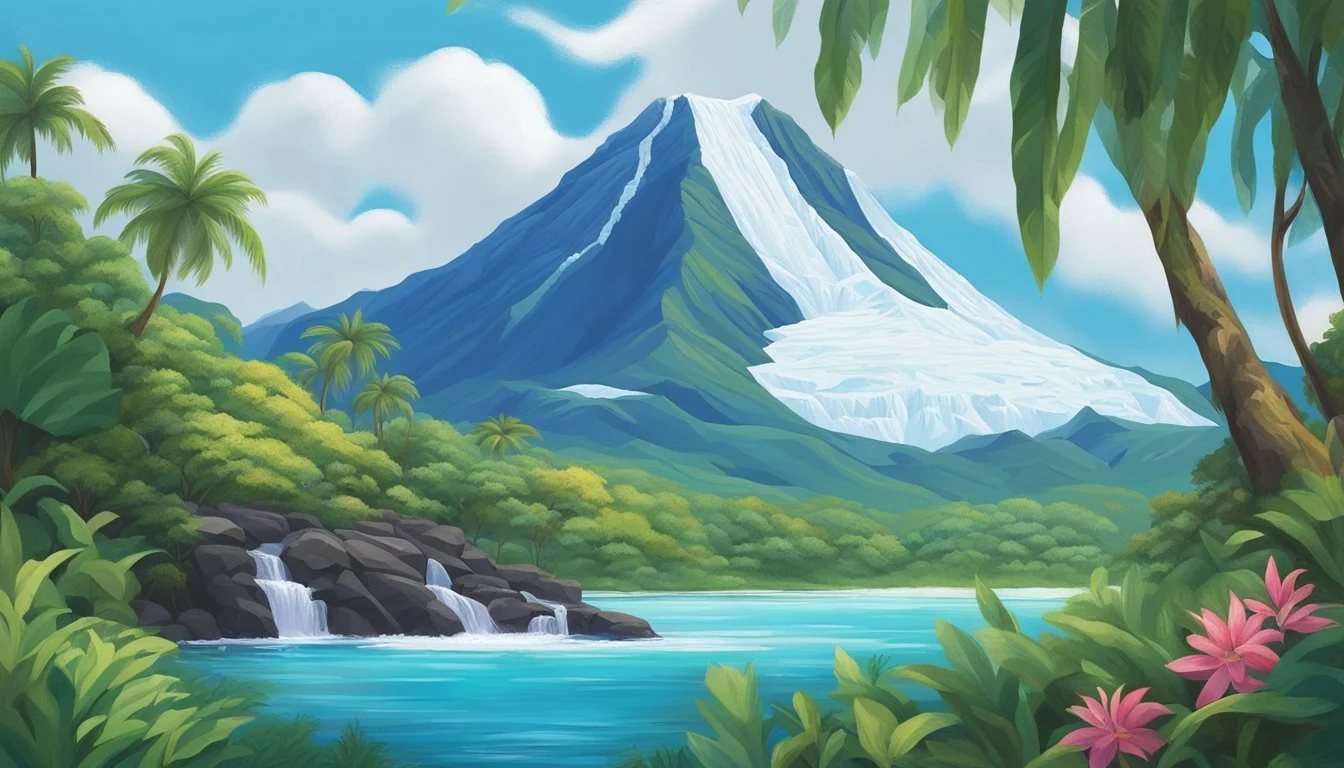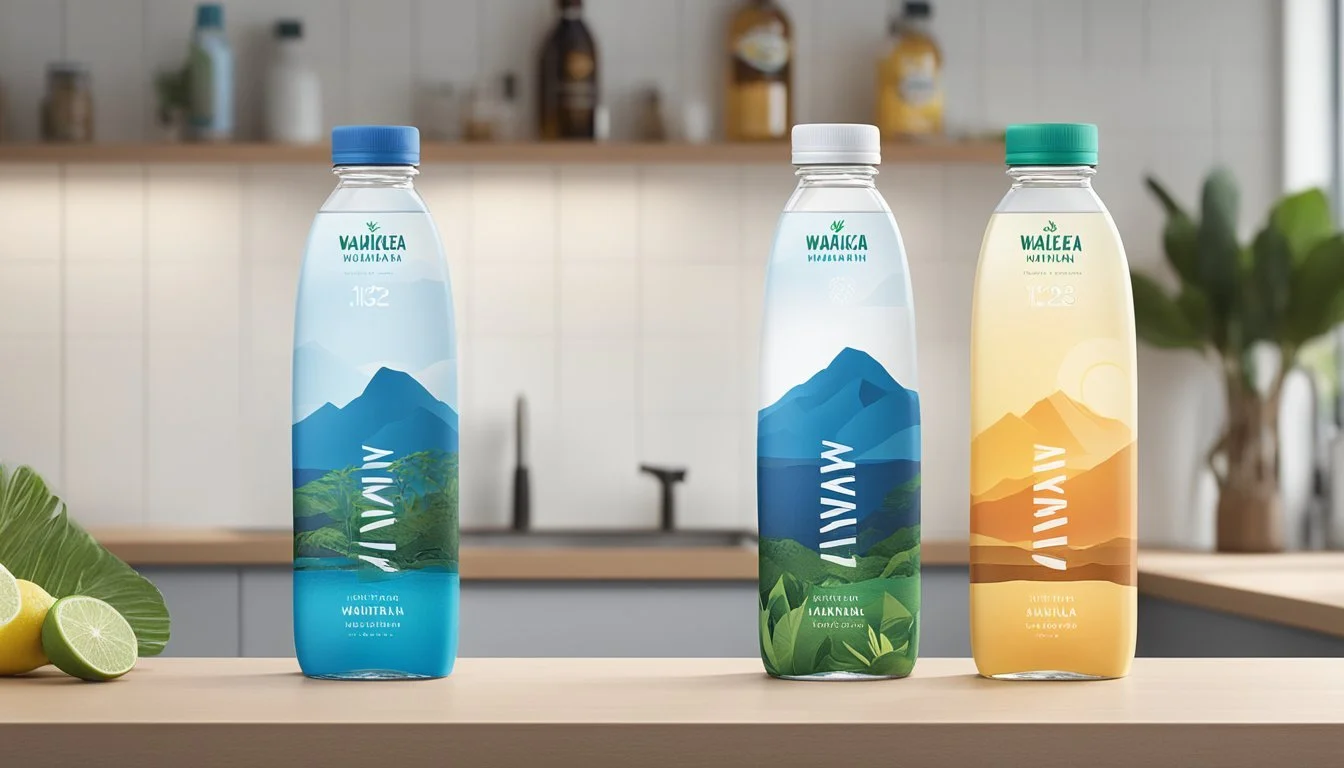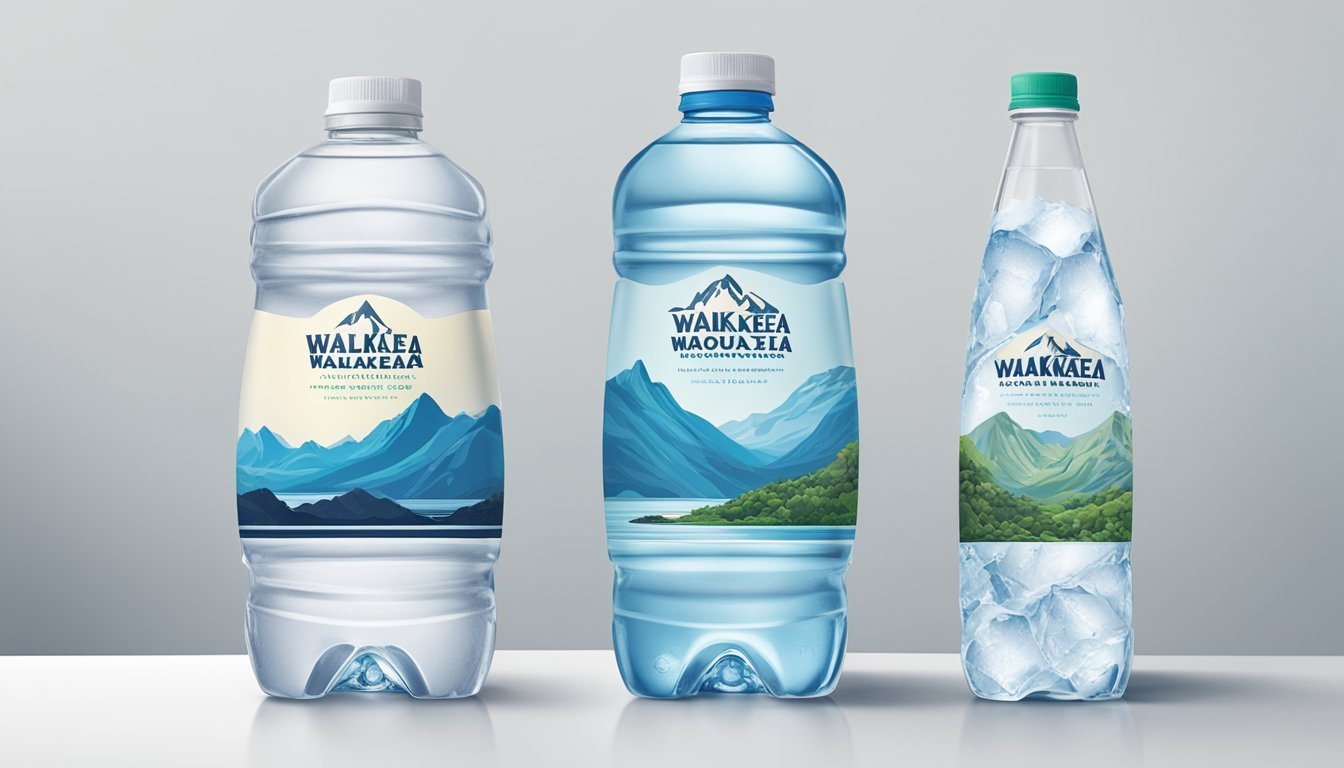Ice Mountain vs. Waiakea
Which Bottled Water Reigns Supreme
Craving a crisp, refreshing drink but torn between Ice Mountain and Waiakea bottled waters? Choosing the right brand can make a significant difference in both hydration and your overall health. Ice Mountain offers a traditional, pure taste derived from Midwestern springs, making it a reliable option for those who prefer a classic bottled water taste.
Waiakea, sourced from Hawaiian volcanic springs, claims to bring a unique blend of minerals and electrolytes that not only enhance taste but also provide a natural hydration boost. Its alkaline pH might appeal to those looking for an added health benefit in their water. Both options have their merits and distinct profiles, suited to different preferences and hydration needs.
When deciding between Ice Mountain and Waiakea, consider what you value most in a bottled water. If you seek a straightforward, clean water experience, Ice Mountain won't disappoint, but if you’re drawn to something with a bit more character and potential health advantages, Waiakea might be worth a try.
Origin and Source
When comparing Ice Mountain and Waiakea bottled waters, understanding the origins and sources provides insight into their unique characteristics. Key points include their geographic sources and the nature of the water collection process.
Ice Mountain Natural Spring Water
Ice Mountain Natural Spring Water originates from multiple groundwater sources located in the Midwest of the United States. The water comes from natural springs in places like Michigan and is collected from underground aquifers. It is known for its balanced mineral content, which includes calcium, magnesium, and sodium.
The water undergoes a multi-step filtration process, ensuring purity and maintaining its clean taste. The natural spring water is carefully monitored to maintain its high quality. This region's groundwater contributes to its refreshing and crisp profile.
Waiakea Hawaiian Volcanic Water
Waiakea Hawaiian Volcanic Water is sourced from the Big Island of Hawaii, particularly from the snowmelt and rain that filter through the Mauna Loa volcano. This process naturally enriches the water with electrolytes and minerals, contributing to its unique taste.
As artesian water, it is sustainably sourced from a well that taps into a deep aquifer. The Hawaiian springs provide naturally alkaline water with a pH of about 8.2, making it not only hydrating but also beneficial for those seeking alkaline water. The volcanic filtration imparts a distinct mineral profile and a silica content that adds a silky texture to the water.
Environmental Impact
When comparing Ice Mountain and Waiakea, it is essential to consider their environmental impact. Both brands take different approaches to sustainability, local community engagement, and the life cycle of their products.
Packaging and Sustainability
Ice Mountain primarily uses plastic bottles made from petrochemicals. While these bottles are widely recyclable, the rate of recycling remains alarmingly low, resulting in a significant amount of plastic waste. The use of plastic also raises concerns about BPA and other harmful chemicals.
In contrast, Waiakea emphasizes eco-friendly packaging, being the first US bottled water certified Carbon Neutral. They utilize recycled materials in their bottles and promote sustainability by reducing the carbon footprint in their production and distribution processes. This focus on environmentally friendly packaging contributes to minimizing waste and resource usage.
Effect on Local Communities
Ice Mountain sources water from the Midwest springs and often faces criticism regarding resource extraction and its impact on local water supplies. Concerns about sustainability and the long-term effects on local ecosystems are prevalent among community members. This extraction can strain local water sources, affecting residents and local ecosystems.
Waiakea, on the other hand, donates over 5% of its revenue to nonprofits, especially in Hawaii and other parts of the world. This contribution aids in community development and environmental conservation efforts. Their approach to supporting local communities goes beyond resource extraction, aiming for a positive social impact alongside environmental sustainability.
Life Cycle Analysis
A life cycle analysis of Ice Mountain shows that from production to disposal, the environmental cost is significant. The use of non-renewable resources for plastic production, combined with a low recycling rate, results in substantial environmental impact.
Waiakea offers a more sustainable life cycle. Their production process, reduced carbon emissions, and efforts in recycling create a lower environmental footprint. Being Carbon Neutral adds to their eco-friendly profile, as it underscores an ongoing commitment to reducing the negative impacts throughout the product's life cycle.
Health and Hydration
Ice Mountain and Waiakea offer distinct benefits concerning health and hydration, particularly when examining their mineral content, electrolytes, pH levels, and purity.
Minerals and Electrolytes
Minerals and electrolytes play a crucial role in maintaining proper body functions. Waiakea is notable for its naturally high levels of electrolytes such as potassium, magnesium, and calcium, which contribute to hydration and overall health. The volcanic filtration process of Waiakea water enhances its mineral profile.
Ice Mountain, sourced from natural springs in the Midwest, contains a moderate amount of minerals. While it does provide some electrolytes, the quantities are typically lower compared to Waiakea. This makes Ice Mountain a slightly less nutrient-dense option for those seeking enhanced hydration through mineral content.
Comparison at a glance:
Aspect Waiakea Ice Mountain Potassium High Moderate Magnesium High Moderate Calcium High Moderate
pH Levels and Purity
The pH level of water affects its taste and how it interacts with the body. Waiakea boasts a naturally alkaline pH of 8.2, which can help neutralize acid in the body and support metabolic functions. This alkalinity is due to its volcanic filtration process, which also contributes to its relative purity and helps maintain low levels of total dissolved solids (TDS).
Ice Mountain generally has a neutral pH level around 7.0, making it neither acidic nor alkaline. While this is ideal for balanced hydration without altering the body's pH significantly, it doesn't offer the potential benefits associated with alkaline water that Waiakea does. Ice Mountain is also known for its purity, often undergoing rigorous testing to ensure it meets safety standards.
Comparison of pH levels:
Aspect Waiakea Ice Mountain pH Level 8.2 7.0 TDS (low=better) Low Low
Taste and Water Sommelier Insights
Ice Mountain and Waiakea present distinct taste profiles, appreciated by water sommeliers for their unique properties. Both brands boast natural sources, contributing to their appeal among bottled water enthusiasts.
Tasting Profiles
Ice Mountain originates from various groundwater sources in the Midwest U.S. It is often noted for its clean and refreshing taste, with balanced mineral content including calcium, magnesium, and sodium. The pH level is moderate, providing a neutral and smooth drinking experience. Tasters frequently describe it as crisp, making it a reliable choice for daily hydration.
Waiakea is sourced from volcanic aquifers in Hawaii. This natural filtration through porous lava rock enriches it with minerals. As a result, Waiakea water has a slightly alkaline pH around 7.6-8.2, imparting a smooth, mild taste with a hint of sweetness. Consumers often find it remarkably clean and pure, suitable for those seeking a premium hydration experience.
Water Sommelier Recommendations
Water sommeliers praise Ice Mountain for its consistent quality and straightforward taste profile. It's regarded as a dependable option for those who prefer a traditional, clean taste. Its moderate mineral content makes it versatile, whether paired with meals or consumed on its own.
Waiakea, on the other hand, receives accolades for its unique filtration process and the resulting purity and taste. Sommeliers recommend it for those who enjoy a slightly more mineralized and alkaline water profile. Its smoothness and light sweetness make it an excellent match for fine dining and special occasions, offering an elevated drinking experience.
In conclusion, both waters have merits, with Ice Mountain favored for its classic taste and Waiakea appreciated for its distinctive volcanic properties.
Comparison of Bottled Water Brands
Ice Mountain and Waiakea are two bottled water brands with distinct characteristics. Each brand has its unique market presence and ways in which consumers perceive them.
Market Share and Brand Presence
Ice Mountain, owned by BlueTriton Brands, is primarily available in the Midwest region of the United States. It is often found in grocery stores and convenience stores, making it a convenient option for many consumers. Ice Mountain's marketing focuses on its sources from natural springs in Michigan, emphasizing local, natural purity.
Waiakea, sourced from a volcanic well in Hawaii, offers a niche market presence. It emphasizes eco-friendliness, being the first U.S. bottled water to be certified Carbon Neutral. Waiakea donates over 5% of revenue to nonprofits and is known for its naturally alkaline properties. Unlike the widespread availability of Ice Mountain, Waiakea is often seen in health food stores and specialized online markets.
Consumer Perceptions
Ice Mountain is appreciated for its reliability and accessibility. Consumers often choose it for everyday hydration due to its affordability and availability. It presents a straightforward, no-frills option, making it a staple among families and individuals alike.
Waiakea, on the other hand, is perceived as a premium brand due to its unique volcanic source and mineral content. The water's alkaline nature and eco-friendly practices appeal to health-conscious consumers and those committed to sustainability. Waiakea's higher price point reflects its perceived quality and environmental commitments. This has helped it carve out a loyal customer base that values these attributes over mere convenience.
Safety and Contaminants
When comparing Ice Mountain and Waiakea, it's essential to look at how each brand handles contaminants, including heavy metals and microplastics, to ensure optimum safety for consumers.
Lead and Heavy Metal Testing
Ice Mountain and Waiakea undergo rigorous testing for lead, heavy metals, and other contaminants. This includes checks for arsenic, mercury, and other harmful substances. Ice Mountain meets federal and state standards, indicating safe levels of lead and heavy metals. Waiakea also boasts certifications highlighting low contaminant levels, particularly through natural filtration processes.
Both brands publish their water quality reports, showing detailed levels of various contaminants. Waiakea uses volcanic rock filtration, which naturally reduces heavy metals. Meanwhile, Ice Mountain's treatment processes include microfiltration and reverse osmosis to target and remove contaminants effectively.
Presence of Microplastics
Microplastics are a growing concern in bottled water. Studies have identified their presence in many brands globally. Ice Mountain's bottles are made from PET plastic, which has been scrutinized for microplastic contamination. Regular testing is carried out, ensuring minimal levels within acceptable safety standards.
Waiakea positions itself with an eco-friendly approach, using 100% RPET bottles (recycled PET). The brand claims higher purity levels and reduced microplastic presence. Tests confirm lower microplastic levels compared to conventional PET bottles. Both brands are aware of the microplastic issue and strive to minimize contamination through advanced filtration and regular testing procedures.
Regulation and Certification
Understanding the regulations and certifications that govern bottled water can help consumers make more informed decisions. Key areas include adherence to FDA standards and the specific certification processes followed by Ice Mountain and Waiakea.
FDA Standards and Compliance
The Food and Drug Administration (FDA) is the main regulatory body overseeing bottled water in the United States. It ensures that bottled water products meet or exceed safety standards set by the Environmental Protection Agency (EPA) for tap water.
Ice Mountain complies with these regulations by undergoing rigorous testing and quality checks. This includes regular screening for contaminants and maintaining proper labeling practices. Both states and specific experts verify these compliance measures to ensure consumer safety.
Waiakea also adheres to FDA regulations. Their water, sourced from a pristine environment in Hawaii, undergoes testing for various pollutants. This includes microbial pathogens and chemical contaminants. Such stringent compliance measures are designed to ensure the water is not only pure but also safe for consumption.
Bottled Water Certification Processes
Certification of bottled water involves third-party audits and evaluations to verify quality and environmental standards. Ice Mountain holds certifications that demonstrate its dedication to quality and sustainability. These often include NSF International certifications for product safety and packaging standards.
Waiakea has earned a reputation for its eco-friendly practices. It is certified CarbonNeutral and is recognized for donating a portion of its revenue to environmental causes. Such certifications require consistent and verifiable adherence to environmental goals, confirmed by regular audits.
These certifications provide an added layer of trust, showing that both brands adhere to high ethical, safety, and environmental principles. Each certification process is designed to reassure consumers that they are choosing a reliable and responsibly-produced product.
Packaging Options and Innovations
Ice Mountain and Waiakea emphasize different approaches in their packaging, driven by sustainability and consumer convenience. The packaging options highlight the brands' commitments to reducing environmental impact and enhancing user experience.
BPA-Free and Eco-Friendly Materials
Ice Mountain uses 100% recyclable plastic bottles, ensuring that consumers have the option to recycle and reduce waste. Despite this, the low overall recycling rates in many regions pose challenges.
Waiakea, on the other hand, opts for more sustainable materials. Their bottles are made from 100% recycled polyethylene terephthalate (rPET), which is both BPA-free and has a significantly lower carbon footprint compared to traditional plastic. This choice demonstrates Waiakea's commitment to eco-friendly practices and sustainability.
Advancements in Bottled Water Packaging
Packaging innovations play a crucial role in appealing to environmentally-conscious consumers. Waiakea bottles feature a unique design that not only reduces plastic use by 90% but also utilizes a more efficient shape for transportation, lowering carbon emissions further.
Ice Mountain continues to explore new packaging technologies, including lightweighted bottles that use less plastic. This initiative decreases the environmental impact while maintaining the convenience of traditional plastic bottles.
By integrating these advancements, both brands aim to attract a broader consumer base looking for sustainability and convenience in their bottled water choices.
Consumer Choice and Considerations
When selecting between Ice Mountain and Waiakea, there are specific factors that consumers often take into account. These include flavor variants, enhancements, and how well the product fits into their lifestyle.
Flavor Variants and Enhancements
Ice Mountain and Waiakea offer distinct flavor profiles and enhancements. Ice Mountain primarily provides spring water with electrolyte additions, catering to those looking for enhanced hydration.
Waiakea, sourced from Hawaiian volcanic rock, offers a naturally alkaline composition, appealing to consumers seeking health benefits. Waiakea’s unique mineral content, compared to the conventional profile of Ice Mountain, is a key factor in consumer choices.
Both brands provide plain and sparkling options, with Waiakea sometimes compared to premium brands like Perrier due to its distinct taste.
Convenience and Lifestyle Matches
Consumers also consider the convenience and how the water fits their lifestyle. Ice Mountain is readily available in most major retail stores, making it a convenient choice for daily hydration needs. Its affordability and widespread distribution appeal to a broad audience.
Waiakea, often marketed as a premium product, attracts eco-conscious individuals due to its sustainable practices, such as using recyclable packaging and supporting environmental causes.
This brand may align better with those leading a health-focused lifestyle, similar to consumers of brands like LaCroix, who prioritize unique health benefits. Availability can be more limited, making it a niche product for specific markets.
Both brands offer options that cater to different habits and preferences, allowing consumers to make choices based on their individual needs and values.
More About Ice Mountain
Core Hydration vs Ice Mountain: Which Bottled Water is Better?
Ice Mountain vs Aqua Carpatica: Which Bottled Water is Better?
Ice Mountain vs Cascade Mountain: Which Bottled Water is Better?
Ice Mountain vs Crystal Geyser: Which Bottled Water is Better?
Ice Mountain vs Crystal Lake: Which Bottled Water is Better?
Ice Mountain vs Essence pH10: Which Bottled Water is Better?
Ice Mountain vs Hawaii Volcanic: Which Bottled Water is Better?
Ice Mountain vs Hawaiian Springs: Which Bottled Water is Better?
Ice Mountain vs Icelandic Glacial: Which Bottled Water is Better?
Ice Mountain vs Kirkland Signature: Which Bottled Water is Better?
Ice Mountain vs Liquid Death: Which Bottled Water is Better?
Ice Mountain vs Mountain Valley Spring Water: Which Bottled Water is Better?
Ice Mountain vs Nestle Pure Life: Which Bottled Water is Better?
Ice Mountain vs Poland Spring: Which Bottled Water is Better?
Ice Mountain vs Proud Source: Which Bottled Water is Better?
Ice Mountain vs Purely Sedona: Which Bottled Water is Better?
Ice Mountain vs Richard's Rainwater: Which Bottled Water is Better?
Ice Mountain vs San Pellegrino: Which Bottled Water is Better?
Ice Mountain vs Simple Truth: Which Bottled Water is Better?
Ice Mountain vs Solan de Cabras: Which Bottled Water is Better?
Ice Mountain vs Talking Rain AQA: Which Bottled Water is Better?
Ice Mountain vs Whole Foods 365: Which Bottled Water is Better?
Ice Mountain vs Whole Foods Italian Still Mineral water: Which Bottled Water is Better?
More About Waiakea
Icelandic Glacial vs Waiakea: Which Bottled Water is Better?
Mountain Valley Spring Water vs Waiakea: Which Bottled Water is Better?
Waiakea vs Kirkland Signature: Which Bottled Water is Better?
Waiakea vs Richard's Rainwater: Which Bottled Water is Better?
Waiakea vs Whole Foods Italian Still Mineral water: Which Bottled Water is Better?










